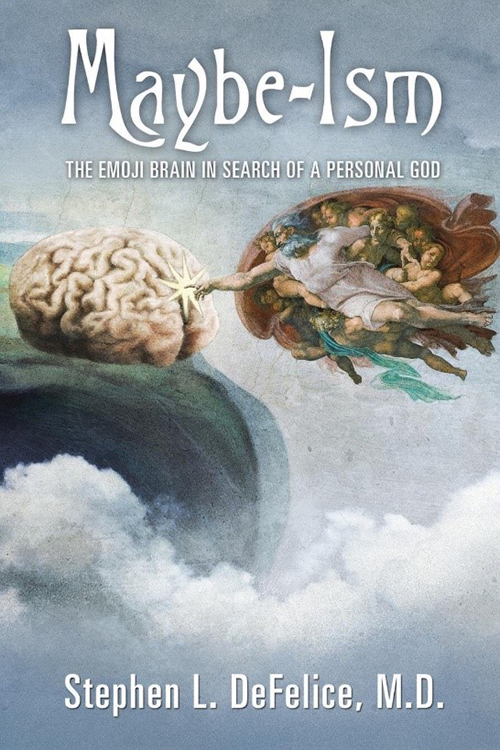The Emoji Brain Examines the Existence of a Personal God
In this recently published provocative book, Maybe-Ism: The Emoji Brain in Search of a Personal God, prominent physician, Stephen L. DeFelice, presents a revolutionary approach which supports the existence of a transcendental being or personal God. Interestingly enough, he persuasively demonstrates that the atheistic arguments of philosophy and Scientism dealing with various subjects such as evolution paradoxically support such an existence. In addition, he introduces new concepts such as the Human Signaler which further strengthens his arguments. Theologians Professor Michael D.H. Asis, former Chair of the Theology department, Ateneo De Manila University, Philippines and Roger Haight, S.J, former president of the Catholic Theological Society of America, offer their opinions regarding potential audiences. (read more)
It’s important to note that this book deals solely with God’s existence and not religion; but let’s not forget that the foundation of religion is based on such an existence. They are intertwined. By attacking one, the other, pari passu, is also attacked. Increasingly, highly effective faulty modern attacks on God’s existence continue to be inexplicably ineffectively opposed.
Regarding Scientism, DeFelice deals with it in separate chapters on the subjects of The Human Transcendental Search, Science and the Universe, Evolution and the existence of The Human Signaler. Regarding faulty intellectual arguments, he deals with them in his chapter on Epistemology and the Emoji Brain. In the final chapter, Putting it All Together, he makes the argument for Maybe-Ism, combining all his aforementioned persuasive arguments in support of God’s existence.
Who should read this slim book? .
For college students: This is the primary group. Universities, including some religious ones, are a highly-influential, anti-God force swaying the minds of students toward doubting God and religion – remember, they are intertwined – before graduation. It’s critical to reach them before diploma time. Professor Asis writes, “The book could very well succeed in starting a conversation between religious leaders and the youth.”
For influential thought leaders who can simplify the book’s arguments to their particular audiences. They need not be religious leaders but also agnostics and atheists, among others. Jesuit Roger Haight writes, “I think it will be informative for many people who read conflict into the relationship between Christianity and a scientific mindset.”
For well-read religious laymen to reinforce their faith, particularly those whose faith has become lukewarm. John Boyle, Esq., a distinguished retired judge of Catholic faith, writes, “Your erudite examination of the ultimate question of existence was fascinating to me. Thanks for opening our minds.”
For all groups: Epistemology, which subject plays a critical role in the book, is not an easy read. Michael Mannion, a non-believer and co-founder of the Mindshift Institute, writes, “The concept of the Emoji Brain is fascinating, not only in itself, but also, in how it relates to how we perceive and how we know. This may be the only book you ever read that makes ‘epistemology’ fun.”
DeFelice is the founder and Chairman of FIM, the Foundation for Innovation in Medicine, a non-profit organization established in 1976 to accelerate medical discovery by establishing a more innovative clinical research community.
Visit: https://www.emojibrain.com for preview and reviews.
Contact: fimdefelice@aol.com
Available at www.amazon.com






